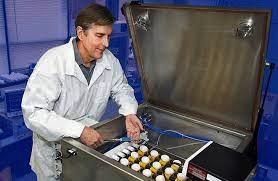 The USDA-Agricultural Research Service, Eastern Region Research Center in Pennsylvania has adapted radio frequency heating technology for in-shell pasteurization of eggs. The principle of radio frequency heating is well established with numerous commercial applications. The ARS development team has successfully created a prototype installation that is effective in eliminating Salmonella within eggs without altering organoleptic properties. An existing commercial scale process involving immersion in hot water is effective in pasteurizing eggs but does result in changes in albumen and is not an in-line process.
The USDA-Agricultural Research Service, Eastern Region Research Center in Pennsylvania has adapted radio frequency heating technology for in-shell pasteurization of eggs. The principle of radio frequency heating is well established with numerous commercial applications. The ARS development team has successfully created a prototype installation that is effective in eliminating Salmonella within eggs without altering organoleptic properties. An existing commercial scale process involving immersion in hot water is effective in pasteurizing eggs but does result in changes in albumen and is not an in-line process.
The question arises as to why the USDA-ARS is expending time and money to produce an RF pasteurizer. There is no evident problem of salmonellosis associated with eggs. Since the introduction of the FDA Final Rule on Salmonella in eggs in 2010 there have been no reported outbreaks of S.Enteritidis among consumers of eggs produced and packed under FDA rules. There however may be a case for pasteurization of shell eggs destined for specific consumers including the immunosuppressed. Serving egg dishes prepared from pasteurized liquids would provide a safe source of nutrition although eggs from regularly tested flocks would provide an acceptable level of risk.
 The USDA press release was overtly deceptive in that the introductory paragraph cited 1.4 million cases of salmonellosis with 26,500 hospitalizations and 420 fatalities annually in the U.S. Eggs produced in accordance with existing regulations and industry procedures are not contributing to salmonellosis among consumers. In actuality multiple serotypes and foods including produce, fruit and undercooked poultry meat are responsible for infection.
The USDA press release was overtly deceptive in that the introductory paragraph cited 1.4 million cases of salmonellosis with 26,500 hospitalizations and 420 fatalities annually in the U.S. Eggs produced in accordance with existing regulations and industry procedures are not contributing to salmonellosis among consumers. In actuality multiple serotypes and foods including produce, fruit and undercooked poultry meat are responsible for infection.
The fact that less than one percent of eggs marketed in the U.S. are pasteurized using the water immersion process, suggests a low demand for in-shell pasteurization and a lack of concern among both domestic and institutional users.
A number of alternative in-shell pasteurization systems have been developed including immersion in hot water, infrared and microwave heating in addition to RF pasteurization. Over twenty years ago, the Government of South Korea developed a pasteurization process that failed to elicit interest. A developer in South Africa produced a microwave in-line system that was widely promoted without achieving commercial adoption.

It is regrettable that the USDA announcement implies an ongoing problem of salmonellosis attributable to eggs and that this prototype laboratory-scale RF pasteurizer would be a solution. It is questioned why USDA funds are expended on a project with little prospect of commercial adoption or intended to alleviate a public health problem that has little to do with eggs. A far more useful project would be to develop a positive kill-step for leafy greens responsible for STEC, Salmonella and Listeria infection.